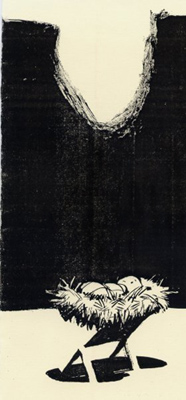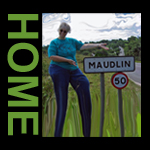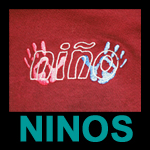
Pressure Point
for the Niņos' Christmas book 2011
© Lynn Maudlin, 2011 - all rights reserved
Artwork © Doug TenNapel - all rights reserved, used by permission
It was a long, slow build which started with an uneasy sense of vacancy— Mary hardly noticed but, really, how could she? Her internal landscape had been drastically altered since the angelic visitation, followed shortly thereafter by her escape to cousin Elizabeth and Zacharias. She had expected to process in solitude but was instead met by Elizabeth's exalted greeting and the whooshing infilling Presence once again, words spoken by her lips and seared into her brain, but at whose prompting? Slowly she grew, watching Elizabeth grow ahead of her, waddling, belly-supporting, moving with deliberate care - and the atmosphere grew around her as a curious pressure.
Mary thought it was dread of Joseph – whatever would he think? What could he think? She was perfectly split: half in fear because he could call for her stoning and, underneath that, wrestling between hope he wouldn't bend to the fierce legality of the old men and dread that his gentle nature would comply. The other half existed in utter certainty that God who had established this miracle would not let it be snuffed out with her own life. Yet the little gnawing teeth caught at the edges of that certainty and asked, "why not?" He had already done the impossible once with her conception, why not bring forth a healthy living infant from her crushed and dying body?
So it was with understandable trepidation that she returned to her father's home near Nazareth. First the shock, then the whispers, the gossip running before her like a wildfire so that when she entered the small community the way was lined with silent forms and dark, probing eyes. Joseph's eyes, wounded and perplexed, her father closing out the world behind the door, her mother throwing an arm like a wing over her, sending away the maids with a single glare. Accusations and questions, seeking explanations or excuses or confessions – but none were forthcoming. Joseph joined them; he brought the ketuba, he spoke of a get, he sought some explanation, some resolution, but he remained perplexed —this was Mary, so good, so pure, so clearly pregnant— how could this be?
And she wanted to explain it but the words would not, could not come; there might as well have been a hand covering her mouth for all her inability to speak.
Joseph left, shoulders drooping, her father's eyes flared and her mother once again sheltered her as would a hen with her chick.
But the next day Joseph returned. "She is my wife," he said with more assurance than Mary had ever seen in him. "Mary will come to my home and live with me; she is my wife. This is not the wedding feast I planned but it is the wedding feast we have," and he brought forth wine and dates and figs and a portion of calf. Her mother brought the day's fresh and aromatic bread while her father brought dried fish, leeks, apples, almonds and honey. The often-amused observer in the back of her head couldn't mock the poor banquet because Joseph's eyes glowed with a new light and her father spoke kindly to her, grateful that her shame was diluted. Her mother cried a little, as a mother must, when her daughter first leaves with her own husband.
Mary and Joseph traveled to Nazareth in silence. Words never flowed easily between them but their silence had never been this peaceful before. After Joseph settled her into his house, he took the donkey to the stable and filled the manger. When he came back inside, Mary lit the sabbath candles and in their soft, shifting light he spoke to her.
"I had a plan," he said. "And then I had a dream, an unearthly dream. God spoke to me in this dream; it was very clear."
And the tears, long held back, flowed from Mary's eyes. She reached out for his hands but he shook his head, "No, not yet," he said. "This child is not my doing but this child is entrusted to me. I will honor the mother of this child as I honor the true Father of this child." And Joseph established her in his home and he slept apart from her, touching her only when taking a cup from her hands or to help her onto the donkey. And the looming pressure grew. Mary thought it might be the gossip of the Nazarenes, assuming that Joseph had known his wife prematurely, or perhaps it was just the higher altitude of this community.
Word came that Elizabeth had born a son and Zacharias, strangely mute, had regained his speech in order to stop them from naming the boy Zacharias after him and said, instead, "His name is John." Mary had begun to waddle like Elizabeth, often putting a protective hand under her large belly when she rose or sat down. And Joseph came to her and told her that they must travel to Bethlehem in Judea in order to comply with the edict of Caesar Augustus, to register and be taxed in his town of origin. Joseph hoped they would be able to make the journey and return before her time but Mary felt no such assurance. And the pressure grew greater still and sometimes the air seemed to vibrate and Mary wondered if she was going to be delivered in death, yet she felt no fear.
For days they traveled and the air thickened around her and Mary felt detached. She slept on bowers Joseph formed and covered with blankets and she ate the bread he gave her; she kept her balance on the donkey as the miles passed under foot. With increasing frequency she had to ask him to stop so that she might walk about and stretch her legs and relieve her bladder. She almost thought she could lean against the air, the pressure felt so solid to her, and yet she moved through it freely.
It was late when they came into Bethlehem, having decided to push through in one long, last day rather than spend another night along the road. This close to Jerusalem the road was crowded and Mary felt oddly conspicuous and compelled to find a place of privacy, away from the eyes of strangers. But Bethlehem was full to bursting and every place they looked for shelter they were turned away. Finally, on the far side of the town, Joseph spoke with great urgency to the last innkeeper and, seeing the young woman, great with child, he directed them to a sheltered stable where they would be warm and dry, out of the elements and away from prying eyes, if they didn't mind a few cattle.
Joseph had barely unloaded the donkey when he heard Mary's cry, a moan, a gasp— he looked and saw Mary clutching her belly, her garment wet with her broken water. In the next hours he alternately held her, rubbed her back, felt helpless as the great birth spasms wrenched her body, and finally helped free the tiny infant, tying and cutting the umbilical cord.
Mary was exhausted and exhilarated. She had felt the great surging pressure, building impossibly, and finally bursting when the child broke forth, spreading and thickening. Now she held her son to her chest and Joseph brought her one of their blankets; with a somewhat sheepish smile he made a cut and tore off a long strip. Mary wiped the baby with her damp clothing and encouraged him to suck as she held him to her breast; she was so pleased when he did, a little, and then she swaddled him in the long cloth and handed the already sleeping infant to Joseph.
"Yeshua," he murmured as he gently placed him in a manger, liberated from the cattle and his donkey, and filled with clean straw.
He turned to Mary, "I'm going to get a bit more wood for the fire," he said. She nodded and curled up beside the manger, her mind a happy blank. Later she would be surprised by a handful of shepherds who tumbled in, telling them how they had settled their flocks when suddenly the air itself burst open and angels, many, many angels, spoke to them and sang and told them to not be afraid but to celebrate with great joy because the savior of the world had just been born, right there in Bethlehem. That strange pressure, so hard for Mary to ever put her finger on, had split the divide between the heavens and the earth, had drawn entities, both godly and ungodly, to the focal point which came into being in the person of her son.
The world would never be the same.



